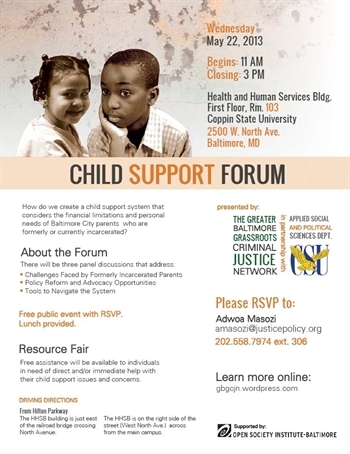The Greater Baltimore Criminal Justice Grassroots Network in partnership with Coppin State University invites you to a community forum to discuss the current state of child support policies in Maryland and provide tools to navigate the child support system. In an effort to improve services, the forum will bring together agency officials, custodial and non-custodial parents, advocates, and service providers to collectively examine the Maryland child support system and how to improve outcomes.

Help promote this event.
WHEN:
Weds., May 22, 2013 11:00 A.M to 3:00 P.M
WHERE:
Coppin State University (2500 West North Avenue)
Health and Human Services Building, Room 103
Free event with RSVP.Lunch provided.For more information and RSVP to:
Adwoa Masozi
[email protected]
202.558.7974 ext.306
More About the Child Support Forum
Child support plays an invaluable role in the quality of a child’s life and their trajectory toward a healthy and positive future. However, non-custodial parents with criminal records often find themselves unable to meet child support obligations due to an inability to secure stable employment.
Last year, the Maryland legislature passed a law that automatically suspends child support payments of non-custodial parents who are incarcerated for more than 18 months and have no financial means to pay child support while incarcerated. This policy, which only applies to individuals sentenced after October 2012, will alleviate incarcerated parents from the stress of owing upwards of $30,000 when released from prison, and prevent severe salary deductions and suspended driver’s license (Job Opportunities Task Force).
The inability to meet child support obligations is discouraging for anyone, especially residents returning to the community from incarceration. These individuals often become so discouraged knowing they will not be able to meet those obligations that they are forced into an underground work world that puts them back on course with the justice system and nobody wins–especially the child.
Child support enforcement practices have traditionally focused on aggressively collecting payments from the non-custodial parent without much consideration to the economic or social plight of the individual. Such policies and practices create additional strains on the family, without regard to the impact on a child’s relationship with each parent and reduce the possibility of collaborative parenting.